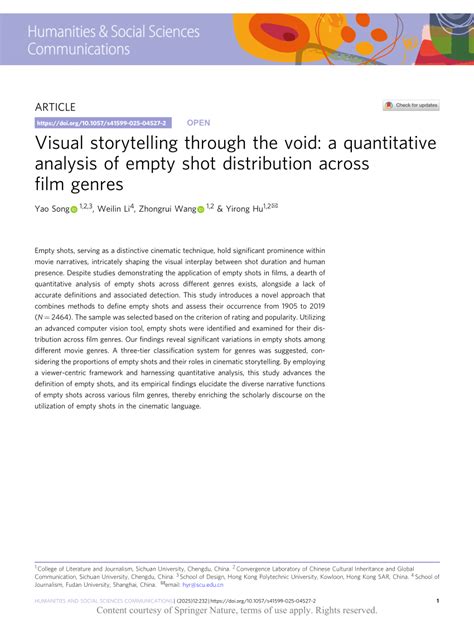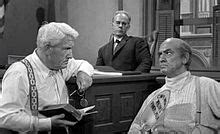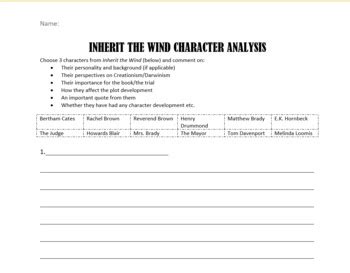The inspiration behind the timeless classic “Inherit the Wind” is a multifaceted and intriguing topic that warrants an in-depth exploration. Written by Jerome Lawrence and Robert Edwin Lee, this play has been a cornerstone of American theater since its debut in 1955. To truly understand the motivations and ideas that fueled the creation of this masterpiece, it’s essential to delve into the historical context, literary influences, and personal experiences of the playwrights.
At its core, “Inherit the Wind” is a powerful exploration of the clash between traditional values and progressive ideas, as embodied by the fictional characters of Matthew Harrison Brady and Henry Drummond. The play’s narrative is loosely based on the real-life Scopes Monkey Trial of 1925, in which a high school teacher, John Thomas Scopes, was prosecuted for teaching evolution in a Tennessee public school. This pivotal event in American history sparked a national debate about the role of religion in education and the limits of academic freedom.
Lawrence and Lee were deeply intrigued by the Scopes trial and its far-reaching implications for American society. They saw the trial as a microcosm of the larger cultural tensions between fundamentalism and intellectual freedom. By dramatizing this conflict, the playwrights aimed to spark a national conversation about the importance of critical thinking, tolerance, and open-mindedness.
One of the primary inspirations for “Inherit the Wind” was the playwrights’ own experiences with censorship and intolerance. During the 1940s and 1950s, America was gripped by a wave of McCarthyism, which led to a proliferation of blacklists, witch hunts, and suppressive measures against perceived dissenters. Lawrence and Lee were both concerned about the erosion of civil liberties and the dangers of unchecked ideological zealotry.
In crafting the characters of Brady and Drummond, the playwrights drew upon their observations of the Scopes trial and its protagonists. Matthew Harrison Brady, the fictional counterpart to William Jennings Bryan, was inspired by the real-life politician’s bombastic oratory style and his unwavering commitment to fundamentalist values. Henry Drummond, on the other hand, was modeled after Clarence Darrow, the brilliant and iconoclastic lawyer who defended Scopes.
The title “Inherit the Wind” itself is a reference to the biblical passage from Proverbs 11:29, which warns that “he that troubleth his own house shall inherit the wind.” This phrase resonated with Lawrence and Lee, who saw the conflicts between traditionalism and progressivism as a troublesome and potentially destructive force that threatened the very foundations of American society.
Throughout the play, the authors employed a range of literary devices to convey their message about the importance of intellectual freedom and critical thinking. The character of Bertram Cates, the young teacher who defies the law by teaching evolution, serves as a symbol of the individual’s right to question authority and challenge established norms. The dramatic confrontation between Brady and Drummond, meanwhile, represents the clash between two competing worldviews: one rooted in dogma and the other in empiricism.
In addition to its literary merits, “Inherit the Wind” has also been recognized for its historical significance and cultural relevance. The play has been widely performed and adapted, including a notable film version starring Spencer Tracy and Fredric March. Its themes and characters continue to resonate with audiences today, serving as a powerful reminder of the ongoing struggle between tradition and progress.
The playwrights' use of the Scopes trial as a historical backdrop serves as a powerful reminder of the dangers of ideological fundamentalism and the importance of protecting academic freedom. By examining the complexities of this pivotal event, "Inherit the Wind" offers a nuanced exploration of the tensions between traditional values and progressive ideas.
In conclusion, the inspiration behind “Inherit the Wind” is a rich and complex tapestry of historical, literary, and personal influences. By examining the playwrights’ experiences, the cultural context of the time, and the literary devices employed in the play, we can gain a deeper understanding of this masterpiece and its enduring relevance to contemporary society.
Historical Context: The Scopes Monkey Trial

The Scopes trial was a landmark event in American history that pitted the proponents of evolution against the advocates of creationism. The trial began on July 10, 1925, and lasted for 12 days, captivating the nation’s attention and sparking a heated debate about the role of religion in public education.
Key Events of the Scopes Trial
- The arrest and indictment of John Thomas Scopes for teaching evolution in a Tennessee public school
- The selection of William Jennings Bryan and Clarence Darrow as prosecution and defense attorneys, respectively
- The dramatic confrontation between Bryan and Darrow during the trial, which highlighted the fundamental differences between their worldviews
- The guilty verdict and subsequent fine imposed on Scopes, which was later overturned on a technicality
The Scopes trial marked a significant turning point in the American cultural landscape, as it brought the debate over evolution and creationism into the national spotlight. The trial’s aftermath saw a surge in public interest in science and education, as well as a growing recognition of the importance of academic freedom and critical thinking.
Literary Influences: Drama and Social Commentary

“Inherit the Wind” is a powerful example of drama as social commentary, a genre that has a long and distinguished history in American literature. The play’s use of character development, plot structure, and thematic resonance owes a debt to the works of earlier playwrights, such as Eugene O’Neill and Arthur Miller.
The Impact of Literary Influences on "Inherit the Wind"
| Influence | Positive Impact | Negative Impact |
|---|---|---|
| Eugene O'Neill's "Mourning Becomes Electra" | Experimentation with non-linear narrative structures and psychological complexity | Potential for overly melodramatic characterizations |
| Arthur Miller's "The Crucible" | Exploration of themes such as intolerance and the dangers of unchecked power | Risk of oversimplifying complex historical events |

By examining the literary influences on “Inherit the Wind,” we can gain a deeper understanding of the play’s dramatic structure, character development, and thematic resonance. The authors’ use of drama as social commentary serves as a powerful reminder of the importance of intellectual freedom, critical thinking, and empathy in our personal and public lives.
What was the primary inspiration for "Inherit the Wind"?
+The primary inspiration for "Inherit the Wind" was the Scopes Monkey Trial of 1925, which pitted the proponents of evolution against the advocates of creationism. The trial's dramatic confrontation between William Jennings Bryan and Clarence Darrow served as a catalyst for the play's exploration of intellectual freedom, critical thinking, and tolerance.
How does the play's title, "Inherit the Wind," relate to its themes and characters?
+The title "Inherit the Wind" refers to the biblical passage from Proverbs 11:29, which warns that "he that troubleth his own house shall inherit the wind." This phrase resonates with the play's exploration of the conflicts between traditionalism and progressivism, as embodied by the characters of Matthew Harrison Brady and Henry Drummond.
What literary devices does the play employ to convey its message about intellectual freedom and critical thinking?
+The play employs a range of literary devices, including character development, plot structure, and thematic resonance, to convey its message about intellectual freedom and critical thinking. The character of Bertram Cates serves as a symbol of the individual's right to question authority and challenge established norms, while the dramatic confrontation between Brady and Drummond represents the clash between two competing worldviews.
In conclusion, “Inherit the Wind” is a masterpiece of American drama that continues to resonate with audiences today. By examining the play’s historical context, literary influences, and thematic resonance, we can gain a deeper understanding of its enduring relevance and importance. As a powerful exploration of intellectual freedom, critical thinking, and tolerance, “Inherit the Wind” serves as a timely reminder of the dangers of ideological fundamentalism and the importance of protecting academic freedom.



